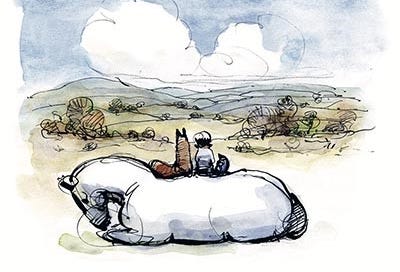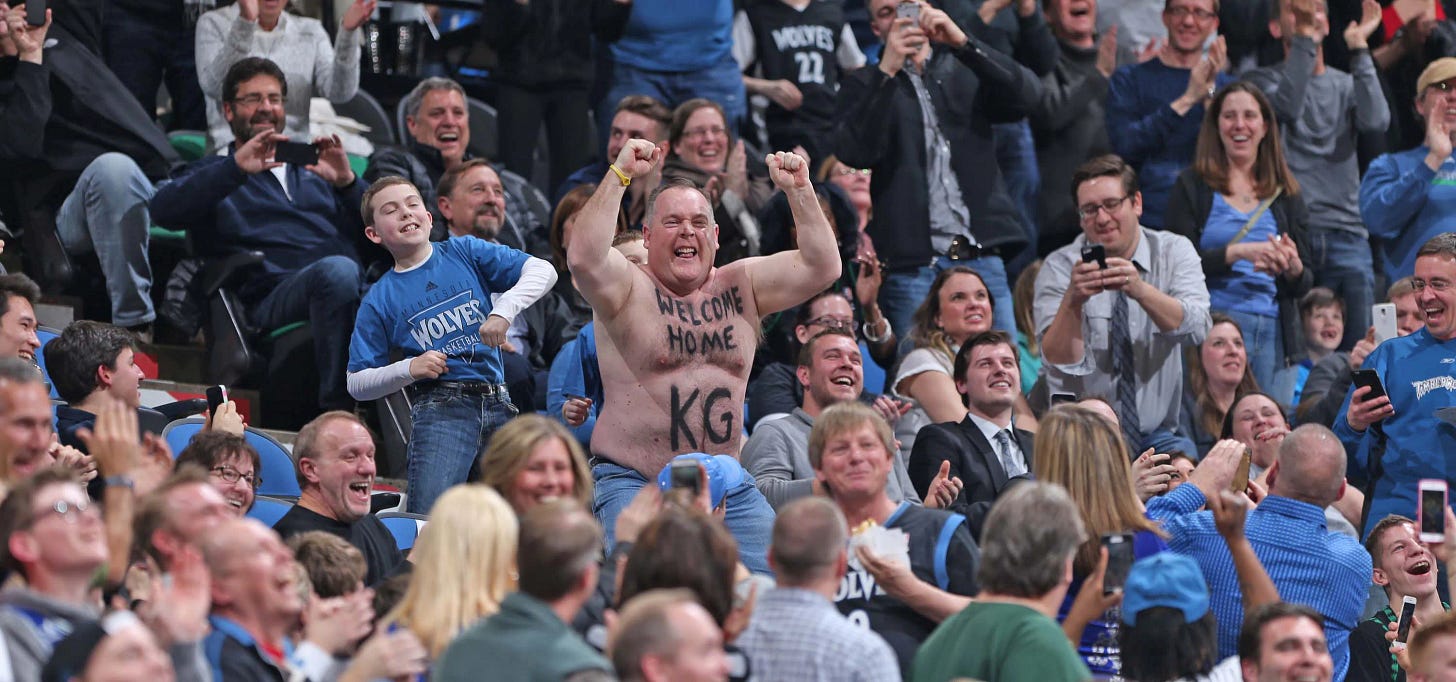The Boy, The Mole, The Fox, and The Timberwolves
I don't think the Timberwolves know what they're doing. Hell yeah.
A truly elite NBA team usually has a pretty solid grip on success.
Generally, the season of a legit contender won’t be derailed by one misstep, injury, or intra-team duel (unless it’s a real, real duel with horses and lances. If your team is jousting to settle differences, you might be fucked.)
That’s because, I think, in order to reach the proverbial mountaintop, a team must first establish a system of solidity. They must be prepared for roadblocks. They must ensure that entropy does not immediately follow whatever problems they inevitably encounter throughout a season.
Strife descends upon all NBA teams, even the elite ones; but the best always adapt. You could argue that’s what makes them the best. Not with me, though. Don’t argue with me. I’m sensitive.
We have seen this occur time and again over the past few seasons. Just to name a few recent examples:
-Jamal Murray went down with an injury and Denver is still one of the league’s best teams.
-Los Angeles has been without Jared Vanderbilt and Gabe Vincent for most of the season and has nevertheless competed at a high level.
-Khris Middleton has been a shadow of his former self in Milwaukee this season, yet the Bucks have separated themselves from the (non-Celtics) pack.
-Miami’s coach and its star player nearly turned into Rock ‘Em Sock ‘Em Robots two seasons and then immediately made it to the Eastern Conference Finals (and the NBA Finals the next year.)
Solidity. Preparation. Contingency plans. A “next man up” mentality. Trust. Buy-in. Whatever you want to call it, the best teams are ships, ready for uneasy waters.
I don’t think the Minnesota Timberwolves have any of those things. I think one big wave will capsize the whole fuckin’ ship.
And I think that’s why I love them so much. They’re capable, but we’ve seen it not work— by “it” I mean pretty much this exact same roster— and since nothing has changed foundationally between when it didn’t work and now (it’s really working now) the possibility of a backslide looms, omnipresent. If that backslide does occur, you have to wonder if the team—and franchise—has any of the systems in place to cope with it.
Can Minnesota power through an Anthony Edwards injury, or Rudy Gobert punching (another) teammate, or a disgruntled Kar-Anthony Towns, or a mutiny against Chris Finch? I mean… probably not.
The Wolves are less secure in their “goodness” than any other NBA team. That’s what makes them so damn alluring.
For the record, I’m not questioning whether Minnesota is actually a good team. They are, clearly; they possess a top-three defensive rating (107.3) a young star (Anthony Edwards is averaging 26.7 points per game, ninth in the league) a veteran point guard in Mike Conley who has a little left in the tank, and a very competent coach in Chris Finch.
But staying a good NBA team is like being a rich person in the US. It’s really fucking easy to keep doing it once you’ve already achieved it, and pretty fucking hard to achieve it in the first place—especially when you don’t have a blueprint for it. And the Timberwolves don’t have any sort of blueprint.
No one really talks about the Timberwolves as one of America’s most inept (least ept?) sports franchises, but… maybe they should. This team hasn’t won a playoff series in two decades and has made the conference finals one time, ever. A few stars have donned the Wolves jersey— Kevin Garnett, Kevin Love, and Greg Stiemsma to name a few—but have never put together a team with a legitimate chance at a title.*
*Really unnecessary shot at Greg Stiemsma here, I’m sorry Greg.
Now, for the moment at least, they’re pretty damn good. But they also used all of their resources—cap, draft picks— to get here. (A strategy I fundamentally agree with, by the way. Fuck your draft picks. Trade them all. They’re not real!)
Minnesota has no blueprint for how to get it done, no future draft picks, no evidence they can win at a high level, and no backup plan.
That’s sick. Let’s ride.
Recently, I read The Boy, The Mole, The Fox and The Horse. Written by Charlie Mackesy, the short, wondrously illustrated story follows the four titular characters on their quest for understanding, if the quest isn’t actually to anywhere specific physically.
In the book’s introduction, the horse says,
“The truth is everyone is just winging it”
I think he’s right.
The older I get, the more I realize that a lot of people (present company included) are figuring shit out on the fly. Jobs, relationships, housing, friends, hobbies— there isn’t a handbook for any of this, so we’re kinda just writing the handbook for ourselves as we experience all of it.
I find myself drawn to those people; the folks who are clearly building the ship after it has already set sail. I’m actually kind of afraid of people who really have their stuff in control. Like, great for you if you fit into this group, but I think you’re a little freaky. The Miami Heat are the NBA’s version of someone who just kind of has everything figured out. Like, no matter what happens, they’ll figure it out at the end of the day. Again… impressive? Sure... fun? Not as much.
The Timberwolves, meanwhile, are relatable. They’re an intelligent person working a job they’re thoroughly underqualified for. They’re your friend who you know is kind and caring but doesn’t know how to show affection, leading to a tough dating life. They’re volatile, and you want them to succeed nonetheless.
How do bad NBA teams become good NBA teams?
Potential, Fulfilled: Think Oklahoma City and Orlando; the Magic were bad last season, returned essentially the same team this year, and now they’re good. Paolo Banchero, Franz Wagner, Jalen Suggs, Cole Anthony have all gotten better because they’ve gotten older, gained more experience, and actually learned how to play the NBA game. These teams are not “promising” anymore. They’re here, good, now. Players get better. Team gets better. That makes sense to me. Good job, Orlando. Good job, Oklahoma City.
Big Trade. This is a gamble. But when it works, it goddamn works. Toronto traded for Kawhi Leonard and immediately won the Finals in 2019. Los Angeles followed that blueprint the next year by trading for Anthony Davis… and they won it all, too (Mickey Mouse ring or not).
New Leader: Everyone who has ever coached an NBA team has forgotten more about basketball today than I will ever know in my life. But I’m still gonna say that some of them are bad at their jobs! Okay, they’re not bad at their jobs. But in 2023, finding harmony between players and coach in the NBA is just as important as the actual acumen of the coach— whether that’s good or bad is a stack for another day— and oftentimes, hiring a new coach can completely transform a team.
The Timberwolves are kind of trying to combine those three solutions. They’re banking on Anthony Edwards becoming a super, superstar (path #1) they’re banking on Rudy Gobert being worth the trove of draft picks they gave up to acquire him (path #2) and they’re hoping Chris Finch has the ears and hearts of the Timberwolves roster, and can also be the coach of a championship team (path #3).
Are any of those hopes unfounded? Delusional? Not really. If they do all come to fruition, is the result an NBA championship? I don’t know. And I don’t think the Timberwolves know, either. I like that. Godspeed, Minnesota.







